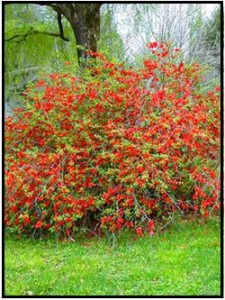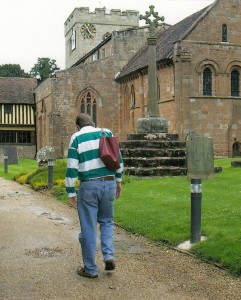This spring our flowering trees and shrubs are over a month ahead of schedule, and we’re loving it. As Louisa said today, “There are blooms in every color of the rainbow right now.” Other years have seen them blossom a month late, but whenever they come, we all get a lift.
Several of the yards in our neighborhood have bushes with a unique approach to blossoming. Although most flowering plants bloom on the previous year’s growth, the “flowering quince” reaches back the year before that, producing pretty red flowers on branch growth from 2 years ago. In other words, this summer’s 2012 growth won’t produce flowers until 2014.
This bush seems oddly programmed by the Creator, and sometimes God programs people in unusual ways, too. All of us have experienced periods of strong spiritual growth when we feel close to the Lord and are making great gains in our inner life. But at other times, we experience a dryness with no “blossoming” going on at all. It might be because we’re in a season of pain, or maybe it’s anger or rebellion against God. Blossoming is out of the question, and we might even feel like we’re dying from the roots up.
But during those seasons of non-productivity, God is quietly working on tiny, invisible buds of change, reaching back to prior periods of soul-growth the way the quince reaches back to bloom on a prior year’s growth. When we least expect it, an inner spring will begin, buds of improvement will blossom, and our relationship with the Lord will become as delightful as a neighborhood full of rainbow-colored flowers, but the “colors” will be things like stability, love, strength, peace, truth, gratitude, joy.
The red blossoms of the flowering quince seem to be in the wrong branch-position every year, just like an early or late blooming spring seems to have missed its proper place on the calendar. Growth spurts in youngsters, too, can seem untimely as kids wait for new height and maturity to come. Our 7 late-blooming children sometimes found it difficult to be the smallest one in the class when their friends had grown a head taller and begun to look like adults, wondering when growth and change would come to them.
But God is in charge of all blooms, the botanical kind, the biological kind, and the spiritual kind. He isn’t in a rush, and he’s never behind in his choice of a blooming schedule. He waits for the optimum moment, and when the time is exactly right, he causes new life to burst forth.
“Let your roots grow down into him… Then your faith will grow strong in the truth you were taught, and you will overflow with thankfulness.” (Colossians 2:7)







